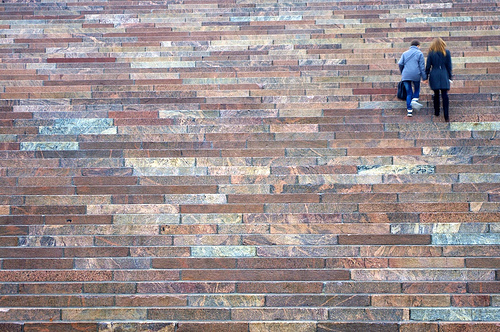
Last week CTV News did a segment with a Canadian doctor named Mike Evans, who started a Twitter campaign to encourage people to take the stairs, park farther away, sit less, and walk more.
There’s nothing groundbreaking about this advice. Telling people to “be more active” is about as new to us as the automobile. But the way he put it — “make your day harder” — is different from the usual message, because it hints that there is something about difficulty itself that should attract us.
What he didn’t quite say is that making your day harder in these ways won’t just make your life better, but easier. We all know it’s “better” to eat quinoa salad than hamburgers, and to take the stairs instead of the elevator, but that doesn’t necessarily convince us to change. “Better”, in the exercise-and-whole-grains sense, has always been on offer, but this better life often seems harder than the one we already have, and the last thing we want is to make life harder.
I think what most of us really want is an easier life, not necessarily a more wholesome one. We want less trouble and more enjoyment, probably more so than we want achievement and virtue. But what we often overlook is that embracing difficulty in certain places nets us a lot more ease than our usual “easy” ways. Putting in three hours a week at the gym is easier than being out of shape 24 hours a day. Studying is easier than sitting in an exam room not having studied. Doing a good job at work is easier than wondering when they’ll finally fire you.
I’m used to thinking of ease and difficulty as a pretty straightforward dichotomy: we want more of one and less of the other. And maybe in a sense that’s true, but they are often found in the same place and come together as a package. A small amount of difficulty often serves as the gatekeeper to a large amount of ease. Read More

 I'm David, and Raptitude is a blog about getting better at being human -- things we can do to improve our lives today.
I'm David, and Raptitude is a blog about getting better at being human -- things we can do to improve our lives today.
It all pretty the opposite if you're not in the US :) Since 2022 I've changed 3 countries and I'm planning to emigrate to the fourth one. I've had so much novelty and so many things to adapt to. However, time had never run so fast for me as in 2022...